- Home
- Harlan Coben
The Match Page 6
The Match Read online
Page 6
“Has someone else gone missing?” Wilde asked.
That had been the case last time she’d come to him like this.
“Yes,” Hester said. “You.”
Wilde didn’t reply.
“Guess who reported you missing,” she continued. “Guess who was so worried about you that he asked me to find you.”
Wilde nodded slowly. “Matthew.”
“What the hell, Wilde?”
He said nothing.
“Why are you ignoring your own godson?”
“I’m not ignoring him.”
“He loves you. You’re the closest thing he has…” Hester just let the words peter out. She changed subjects for a moment. “I did everything you asked, right?”
“Yes,” Wilde said. “Thank you.”
“So what happened when you found your father?”
“Dead end.”
“I’m sorry. So what’s the next step?”
“There is no next step.”
“You’re giving up?”
“We’ve discussed this before. Finding out how I ended up in the woods won’t matter.”
“What about Matthew?”
“What about him?”
“Does he matter? I know we are all supposed to shrug off your eccentricities as ‘Oh, you know how Wilde is,’ but that’s no excuse for ignoring Matthew.”
Wilde thought about that. Then he nodded and said, “Fair.”
“So what’s the problem?”
“Matthew’s in college.”
“He’s home on break.”
“Yeah, I know.”
Hester nodded. “You’re still keeping an eye on them.”
Wilde did not reply.
“So why…?” Hester shook her head. “Never mind. Get in the car. We’ll drive over together.”
“Nah.”
“Seriously?”
“I’ll be in touch before the end of the day,” Wilde said. “Tell Matthew.”
He turned and started toward the woods.
“Wilde?”
He stopped.
Hester tried to keep her voice even. Hester hadn’t planned on raising this, not yet anyway. She’d hoped to see him a few times, ease into it, but that wasn’t her style and it wasn’t his style, and part of her feared that confronting him on this now, the tragic event that bonded them forever, would just lead him to disappear deeper into the woods. “Right before you left the country”—she heard the crack in her tone, tried to stifle it—“I made Oren take me to that spot up Mountain Road. To the embankment.”
Wilde didn’t move, didn’t turn and face her.
“A makeshift cross is still there. On the side of the road. All these years later. Weathered and faded, I guess, but it still marks the spot where David’s car went off the road. You probably know that. That the cross is still there. I bet you visit sometimes, don’t you?”
Wilde still wouldn’t face her.
“I looked down that embankment. Where the car skidded off. I let myself picture it all—the whole thing. The icy road. The dark.”
“Hester.”
“Do you want to tell me what really happened that night?”
“I told you.”
Her eyes filled with tears. “You always said it was your fault.”
“It was.”
“I don’t believe that anymore.”
Wilde did not move.
“I mean, I never fully believed it, I don’t think. I was in shock for a very long time. And I didn’t see a need to know the truth. Like you. With your past. What’s the difference, you always tell me—you’ll always be the boy left in the woods. What’s the difference, I told myself—my son will always be dead.”
“Please.” Wilde slowly turned back to face her. Their eyes locked. “I’m sorry.”
“You’ve said that before. But I never blamed you. And I don’t want your apologies.”
He stood there and looked very lost.
“Wilde?”
“Tell Matthew I’ll be in touch,” Wilde said, and then he disappeared into the thicket.
Chapter
Six
Hester, Wilde knew, was right about Matthew. He should not have stayed away.
Things had changed. That had been his rationale. Matthew was grown and was at college. More to the point, Laila had a boyfriend now, the first guy she’d kept around since David’s death eleven years ago. Wilde had no rights here. He had no standing. He wanted no part of it. In the past, his presence had been, he hoped, a comfort to her. There had been a role for him. Now that role was gone. He could only cause disruptions.
So he stayed away.
Of course, Wilde still kept a clandestine watch on Laila and Matthew from the woods—that was how he knew Matthew was back—but his vigils were becoming less and less frequent. There is a fine balance between being appropriately protective and creepily stalking.
Still, Laila was one thing. Matthew was another. So maybe he was just making excuses. Maybe he had simply been selfish. In the past year, he had taken too many risks in terms of personal entanglements. Now he wanted to take none.
Hester had also surprised him by bringing up the car crash. Why? And why now?
Wilde stopped by a specific tree and dug up one of his hidden stainless-steel lockboxes. He had six such all-weather storage containers throughout the forest, all with fake IDs, cash, passports, weaponry, and disposable smartphones.
Wilde tucked the box under his arm and hurried back to his microhome—a state-of-the-art, off-the-grid abode called an Ecocapsule. The cutting-edge habitat was tiny, under seventy square feet of habitable space, yet it had everything Wilde needed—a folding bed, a table, cabinets, kitchenette, a shower, an incinerator toilet that turned your waste into ash. The Ecocapsule incorporated both solar and wind power. The pill-shaped exterior not only minimized heat loss but facilitated collecting rainwater into water tanks where it could be filtered for immediate use. With the pod being both mobile and camouflage-skinned—not to mention the advanced security features he had set up—Wilde had made himself very difficult to locate.
He opened the box and took out a military-grade disposable phone. The safety features made it virtually impossible to track, but the key word here was “virtually.” No matter what you’re told, there is always a backdoor when it comes to technology, always a way to track and uncover, always, at the end of the line, a human who can see what you are doing if you’re not careful. Wilde tried to mitigate that via various VPNs and internet masking technologies.
Once the protective protocols were in place, Wilde powered up the device and checked his texts and emails. For a second, Wilde wondered whether his father, better known as Daniel Carter, had reached out, but that would be impossible. Wilde hadn’t given him any contact information. When his alarms had first sounded—when Hester had crossed into the woods from his overgrown path—he’d let the thought that it was indeed Daniel Carter enter his mind, that after Wilde had taken off without a warning or goodbye, his father had taken it upon himself to do some research and had either figured out where Wilde could be or had gone to Hester to help find him or…
Didn’t matter.
Wilde checked his messages for the first time in months. He spotted a few from Matthew, always brief, basically asking him where he was. There were two from Rola, his foster sister, the first asking where he was, the second reading:
Sigh. Don’t be like this, Wilde.
He should call her too.
Nothing from Ava. Nothing from Naomi. Nothing from Laila.
Then he saw a message that surprised him.
It was from PB, sent via the DNAYourStory messaging service. The email was dated September 10, eight months ago. Wilde hit the message link. It brought him to the full thread of messages between him and PB in ascending timeline order.
The first communication had come from PB to Wilde a year ago, before he left for Costa Rica:
To: WW
From: PB
Hi. Sorry about not giving my name, but there are reasons I don’t feel comfortable letting people know my real identity. My background has too many holes in it and a lot of turmoil. You are the closest relative I’ve found on this site, and I wonder whether you have holes and turmoil too. If you do, I may have some answers.
Wilde hadn’t replied until months later, not until he sat in Liberia Airport and waited to fly to Las Vegas to confront his father:
To: PB
From: WW
Sorry I didn’t reply sooner. I found my father on here. I’m going to attach a link to his profile. Could you let me know if he also came up as a relative of yours? If so, we will know whether we are related on my mother’s or father’s side. Thank you.
But after Wilde’s visit to Las Vegas, he’d chosen not to pursue the matter anymore or check his emails. What was the point? He realized now that it sounded as though he was wallowing in his own pity party, but that wasn’t it. He craved isolation. It was just how he was built. The shrinks had a field day with how his upbringing made him this way, how important the first five years of life are, and to make no attachments during that era, no physical or emotional contact, to be alone with no other human beings, all of that made him become irreparably damaged.
Could be, Wilde thought.
He didn’t know, and he wasn’t sure he cared. He’d never really hunted for his true identity because he could never see the point. It wouldn’t change those first five years, and while he understood that he was “not normal,” he wasn’t unhappy this way either. Or maybe he was and was fooling himself. Living in the woods didn’t make you any less prone to the same self-delusions the rest of mankind conjures up.
Too much self-reflection today. That had to do with Matthew, of course. And Laila.
&nb
sp; Especially Laila.
The bright red lettering said CLICK HERE FOR NEW MESSAGE! Wilde did so and the message popped up:
To: WW
From: PB
Your father’s profile isn’t related to me, so I guess that we are related on your mother’s side. I hope it all works out with seeing your father. Let me know how that goes.
Since my last message to you, my life has taken a dark turn. When you find out who I am, you will probably hate me like everybody else does. I was warned this would happen. What goes up has to come down. That’s what they always say. The higher up you go, the harder it is when you crash. Well, I was up high without a care in the world, so you can imagine the crash.
Sorry if this seems all over the place. I don’t know where to begin. There are so many lies out there about me. Please don’t believe them.
I’m at the end of my rope. I don’t see any way to survive. Then your message came in like someone had thrown a life preserver to a drowning man. Do you believe in fate? I never did. I don’t have family I can trust. Everything I knew about myself and my upbringing turned out to be a lie. You’re my cousin. I know that doesn’t mean anything and yet maybe it does. Maybe it means everything. Maybe you messaging me back right now is meant to be.
I’ve never felt so lost and alone. The walls are closing in. I really can’t escape it. I just want to sleep. I just want peace. I want it all to go away. You probably think I’m crazy, writing to you, a stranger, like this. Maybe I am. First, they lied to me. Now they’re lying about me. They’re relentless. I can’t fight back anymore. I try but it only makes it worse.
Could you call me? Please? My private mobile is listed below. Don’t give this out to anyone. Please. You’ll understand when we talk.
Wilde looked up past the branches to the sky. The message had been sent almost four months ago. Whatever crisis PB had been dealing with had probably passed. Even if it hadn’t, Wilde saw no way that he could help. It sounded like PB mostly needed a shoulder to cry upon. That was not Wilde’s forte.
Hester would be with Matthew by now. It would be wrong to keep them waiting.
Then again, what was there to lose by making a phone call?
Wilde dreaded it, of course. Having to explain himself. Tell PB that he was the anonymous WW. Apologize for not replying sooner. And then what? Where would the conversation go?
Wilde started heading back down the other side of the mountain, toward David’s house. He still thought of it that way, even though David had been dead for eleven years. When he’d walked two hundred yards, Wilde stopped, took out his phone, and dialed PB’s phone number. He put the phone to his ear and felt a thud-thud in his chest as he listened to the ring. Somehow, he knew that this decision—the decision to reach out to the seemingly tormented PB—would change everything. He didn’t believe in the supernatural or any of that, but when you live with the animals, you start to trust a certain buzzing in your body. The danger instinct is real. You have it too. If your bloodline has survived this long, it’s because, unbeknownst to you, that primitive instinct has been a part of your DNA makeup.
And speaking of DNA…
PB’s phone rang six times before a robotic voice pronounced that the owner of this mobile phone had not set up their mailbox. Interesting.
Wilde hung up. Now what?
He considered sending an anonymous text, but he was not sure what exactly he would say. Did he want to reveal that the message was from WW?
Or should he just let this be?
Not really an option. Not this time. Leaving out the possibility that following up could lead to his mother, PB had written to Wilde for help. PB had been desperate and had no one to turn to, and Wilde had ignored his cry for four months.
He sent a short text:
This is WW. Sorry for the delay, PB. Text or call me back when you can.
He jammed the phone into his front pocket and started down the mountain.
Chapter
Seven
Fifteen minutes later, Wilde stood at the tree line separating the Ramapo Mountains from the Crimsteins’ backyard. He saw movement in the second-floor window on the right. Laila’s bedroom. Weird to think it, but the truth was the truth: Wilde had spent the best nights of his life there.
Wilde flashed back to the first time he had stood in this tree line, though the memory had faded. Six-year-old David had been playing in the yard with his two older brothers. There was a fairly elaborate cedarwood swing set in the yard with slides and a clubhouse and monkey bars. Wilde had been, he now realized after meeting his father, five years old. Up until that day, Wilde had never talked to another human being.
Or at least he had no memory of it.
Young Wilde did know how to speak. He’d spent most of that winter in a lake cabin near the New York–New Jersey border. Most people only used these homes in summer. Wilde remembered going from house to house, trying doors and windows, frustrated that they were all locked. He finally kicked in one small basement window, forming an opening barely big enough for the little boy to slide in. Luckily, the cabin had been winterized, and while that meant there was always the threat that someone could visit, it also meant that young Wilde had running water and electricity. The family that lived there either had children or grandchildren. There were toys to play with and, more important, VCR tapes from PBS television like Sesame Street and Reading Rainbow. Wilde spent hours watching them, talking out loud, so despite the comparisons to Tarzan and Mowgli, Wilde had educated himself enough to understand that there was a world out there, that the world was larger than him and the woods.
David’s older brothers were supposed to watch their young sibling, but they were busy playing some kind of game involving capturing the clubhouse. Wilde watched them. This wasn’t the first time he’d ventured near the tree line and watched his fellow man interact. He’d even been spotted a few times by various hikers, campers, and even homeowners, but Wilde just ran off. Some people probably reported him to the authorities, but really, what would they say? “I saw a boy in the woods.” So what? It wasn’t as though he ran around in a loincloth—he’d stolen clothes from the homes he’d broken into—so for all anyone knew, he was just a kid wandering on his own.
Stories had surfaced about the “feral boy,” but most people dismissed them as the product of sun, exhaustion, drugs, dehydration, alcohol, whatever. The older Crimstein boys were now roughhousing on the lawn, laughing and wrestling and rolling around. Wilde watched, transfixed. The back door opened and their mother shouted, “Dinner in fifteen minutes, and I’m not giving a second warning.”
That had been the first time Wilde heard Hester Crimstein’s voice.
Wilde was still watching the brothers roll on the ground when he heard a voice near to him say, “Hello.”
It was a boy around his own age.
Wilde was about to run. There was no way this kid, even if he tried, could keep up with him through the labyrinth of the forest. But the same instinct that normally commanded him to flee told him to stay. It was that simple.
“Hello,” he said back.
“I’m David. What’s your name?”
“I don’t have one,” Wilde said.
And so their friendship began.
Now David was dead. His widow and his son lived in this house.
The back door opened. Matthew stepped into the yard and said, “Hey, Wilde.”
The two men—yes, Wilde reluctantly admitted to himself, Matthew was more man than boy now—headed toward one another, meeting in the middle of the yard. When Matthew threw his arms around him, Wilde wondered how long it had been since he’d had physical contact with another person. Had he touched anyone since Vegas?
“I’m sorry,” Wilde said.
“It’s okay.”
“No, it’s not.”
“You’re right, it’s not. I worry about you, Wilde.”
Matthew was so much like his father that it hurt. Wilde decided to veer the conversation off this particular track. “How’s college?”
Matthew’s face lit up. “Beyond awesome.”
The back door opened again. It was Laila. When her eyes met his, Wilde felt his heart somersault. Laila wore a white blouse open at the throat and a black pencil skirt. She had, he imagined, just come home from her law office, shed the suit coat, slipped out of the work heels and into the white sneakers. For a second or two, he stared, just stared, and didn’t really care if anyone noticed.

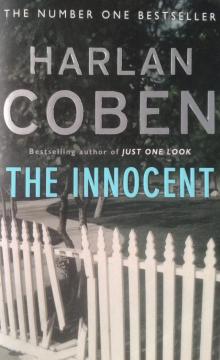 The Innocent
The Innocent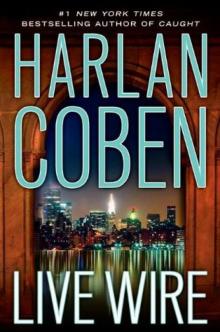 Live Wire
Live Wire Play Dead
Play Dead Drop Shot
Drop Shot Seconds Away
Seconds Away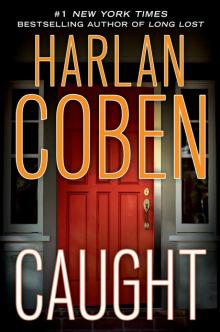 Caught
Caught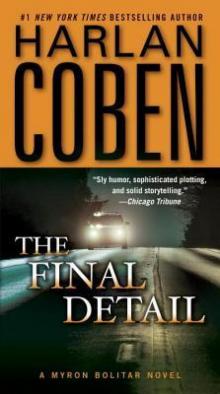 The Final Detail
The Final Detail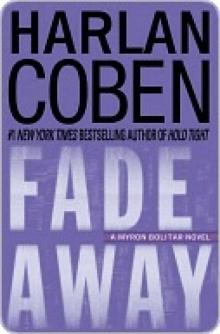 Fade Away
Fade Away Home
Home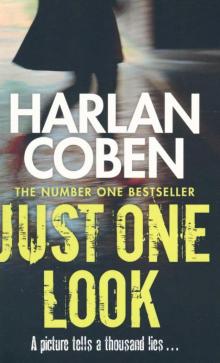 Just One Look
Just One Look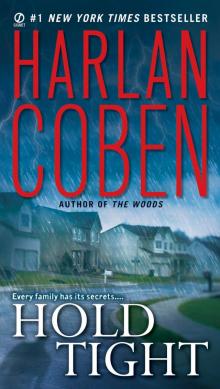 Hold Tight
Hold Tight Fool Me Once
Fool Me Once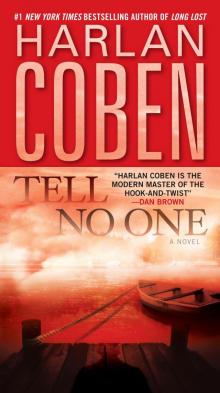 Tell No One
Tell No One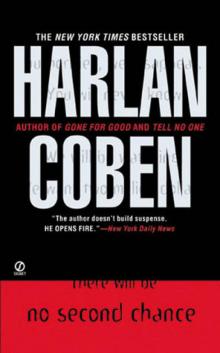 No Second Chance
No Second Chance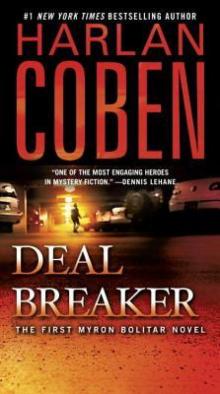 Deal Breaker
Deal Breaker Long Lost
Long Lost One False Move
One False Move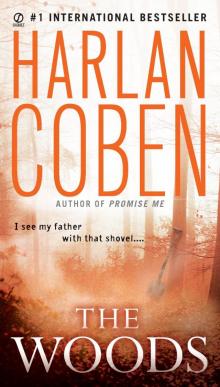 The Woods
The Woods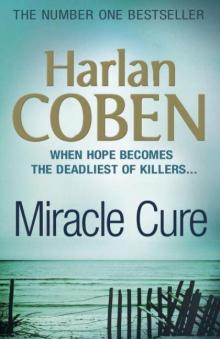 Miracle Cure
Miracle Cure Found
Found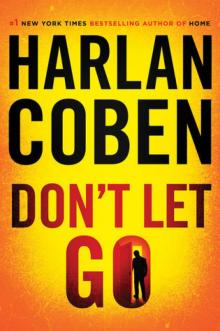 Don't Let Go
Don't Let Go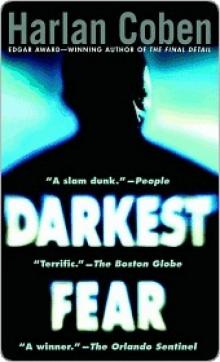 Darkest Fear
Darkest Fear The Stranger
The Stranger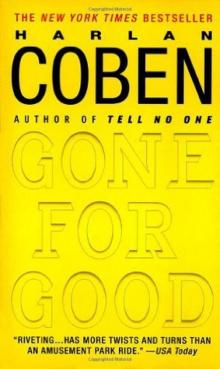 Gone for Good
Gone for Good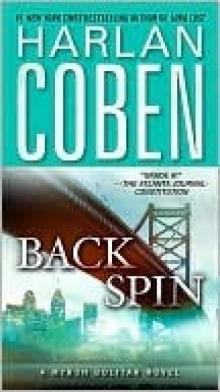 Back Spin
Back Spin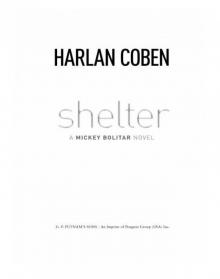 Shelter
Shelter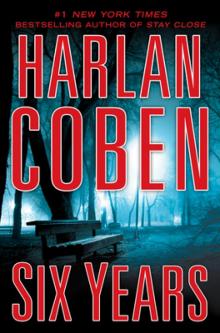 Six Years
Six Years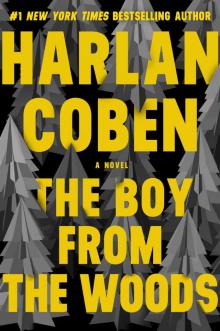 The Boy from the Woods
The Boy from the Woods Missing You
Missing You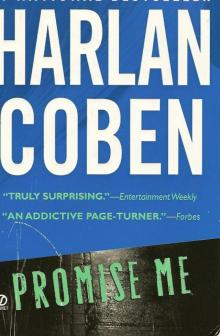 Promise Me mb-8
Promise Me mb-8 The Final Detail: A Myron Bolitar Novel
The Final Detail: A Myron Bolitar Novel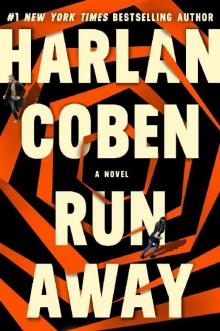 Run Away
Run Away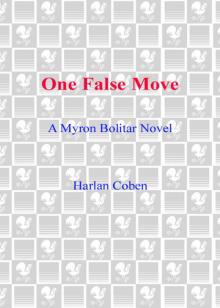 One False Move: A Myron Bolitar Novel
One False Move: A Myron Bolitar Novel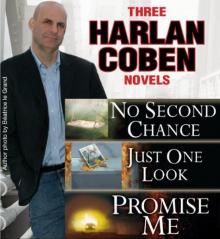 Three Harlan Coben Novels
Three Harlan Coben Novels the Woods (2007)
the Woods (2007) Tell No One (2001)
Tell No One (2001) the Innocent (2005)
the Innocent (2005)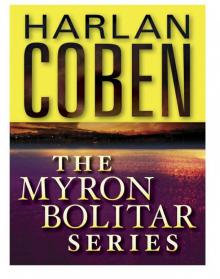 The Myron Bolitar Series 7-Book Bundle
The Myron Bolitar Series 7-Book Bundle Gone for Good (2002)
Gone for Good (2002) Caught (2010)
Caught (2010) Hold Tight (2008)
Hold Tight (2008)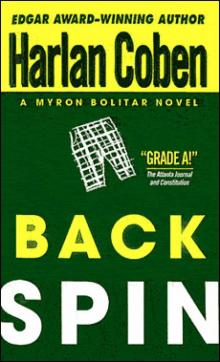 04 - Back Spin
04 - Back Spin Miracle Cure (1991)
Miracle Cure (1991) Harlan Coben 3 Novel Collection
Harlan Coben 3 Novel Collection Just One Look (2004)
Just One Look (2004)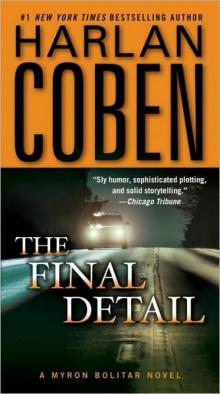 The Final Detail mb-6
The Final Detail mb-6 Play Dead (2010)
Play Dead (2010)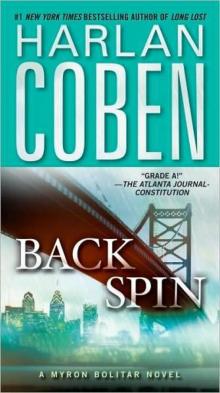 Back Spin mb-4
Back Spin mb-4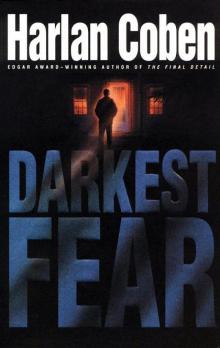 Darkest Fear mb-7
Darkest Fear mb-7